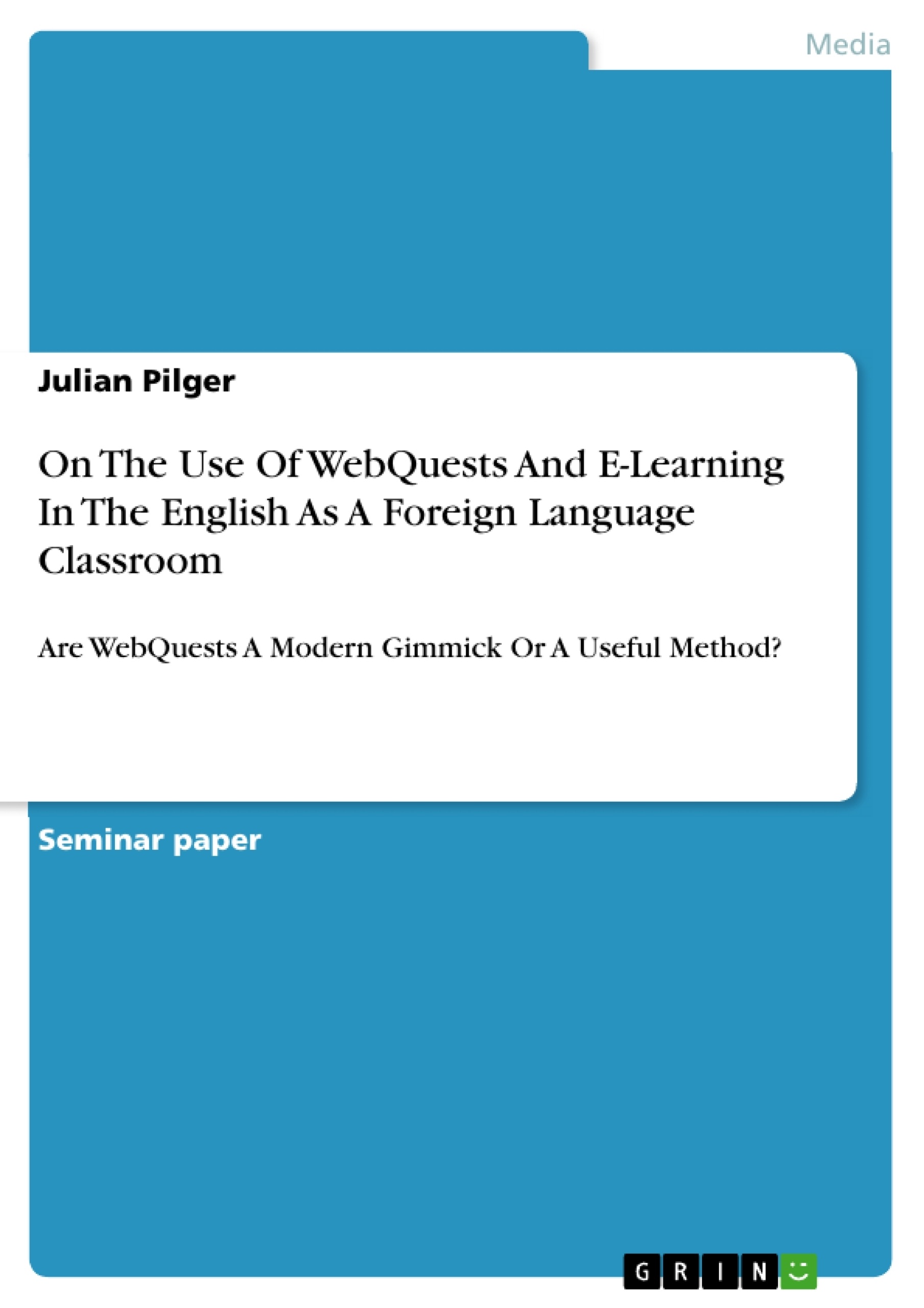In the following, an internet based activity, namely the WebQuest, is going to be observed by analyzing possible risks and benefits and its importance on the very relevant teaching aim of media literacy and competences referring to that. Then, a concrete example of such a task will be shown and an overall conclusion will be drawn in order to answer the initial question of this paper of whether the method of WebQuests is a useful one or not.
Additionally, this paper justifies its relevance by the fact that WebQuests were not originally designed for language learning, so that creating one possibly is a challenge but the outcome will hopefully be supporting with regards to developing future WebQuests for the actual usage concerning me being a teacher.
Being a modern (English) language teacher means to include the various forms of information technology (IT) available in the 21st century such as computers or even interactive whiteboards.
IT can now add valuable extra dimensions to teaching English as a foreign language. Consequently, the usage of IT can definitely improve English language teaching for various reasons. Besides providing teachers with current material for every topic and easily overcoming geographical distance in order to observe relevant cultural aspects of the target language or to interact with native speakers, it is fun and therefore motivating for the students.
The main goal of foreign language teaching is the mediation of competences which enable the students to communicate and overcome the language barrier. Concerning possible problems and risks, the time consuming aspect of WebQuests cannot be disregarded. They demand time beforehand and even though they can save teacher’s time in the long term, WebQuests need to be nurtured when they are expected to perform over a longer period of time. The hyperlinks providing the learners with the sources need to be checked from time to time which means that WebQuests also need time in the long term.
Inhaltsverzeichnis (Table of Contents)
- Introduction - What is E-Learning?
- WebQuests
- Problems and Risks
- Benefits and Possibilities
- WebQuests and Media Literacy – MedienkomP@ss 2017
- Example WebQuest: Research Center for the Life and Times of William Shakespeare
- Conclusion
- Sources
- Appendix
- MedienkomP@ss 2017
- WebQuest website (offline version)
Zielsetzung und Themenschwerpunkte (Objectives and Key Themes)
This paper aims to examine the usefulness of WebQuests as a method for English as a Foreign Language (EFL) teaching. It explores the potential benefits and risks of using WebQuests in the classroom, with a particular focus on the development of media literacy skills. The paper also provides a concrete example of a WebQuest and offers a concluding assessment of the method's suitability for EFL instruction. The paper emphasizes the challenge of adapting WebQuests, originally designed for other purposes, for language learning.
- The evolving role of technology in EFL teaching
- The potential benefits and risks of using WebQuests in the EFL classroom
- The importance of media literacy in EFL teaching
- The development of WebQuests for specific language learning objectives
- The effectiveness of WebQuests as a teaching tool for EFL learners
Zusammenfassung der Kapitel (Chapter Summaries)
- Introduction - What is E-Learning? This chapter provides an overview of the changing landscape of language teaching, highlighting the increasing role of technology and online resources in EFL classrooms. The chapter defines e-learning and its potential for promoting student development.
- WebQuests This chapter defines WebQuests and their origins. It explores the concept of inquiry-based learning and the relationship between WebQuests and gaming, suggesting that WebQuests can motivate students by tapping into their existing gaming habits. The chapter also outlines the structure of a typical WebQuest, which consists of five parts: introduction, task, process, resources, and evaluation.
Schlüsselwörter (Keywords)
EFL, e-learning, WebQuests, media literacy, inquiry-based learning, technology integration, language teaching, student motivation, classroom resources, online learning, interactive activities, collaborative learning, media competence, English as a Foreign Language, WebQuest design, educational resources.
Frequently Asked Questions
What is a WebQuest?
A WebQuest is an inquiry-oriented activity where most or all of the information used by learners comes from resources on the internet.
How do WebQuests benefit EFL students?
They provide authentic materials, increase motivation through IT usage, and help develop media literacy and communication skills.
What are the risks of using WebQuests?
The primary risk is the time-consuming nature of creating and maintaining them, as hyperlinks must be checked regularly to ensure they still work.
What are the five parts of a typical WebQuest?
A standard WebQuest consists of an introduction, task, process, resources, and evaluation.
How does a WebQuest promote media literacy?
It requires students to analyze, evaluate, and synthesize information from various online sources, which are core competencies of media literacy.
- Arbeit zitieren
- Julian Pilger (Autor:in), 2018, On The Use Of WebQuests And E-Learning In The English As A Foreign Language Classroom, München, GRIN Verlag, https://www.grin.com/document/452268



